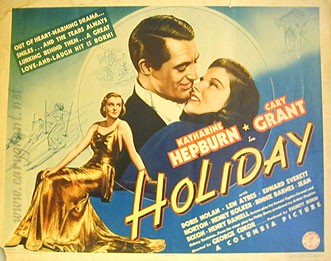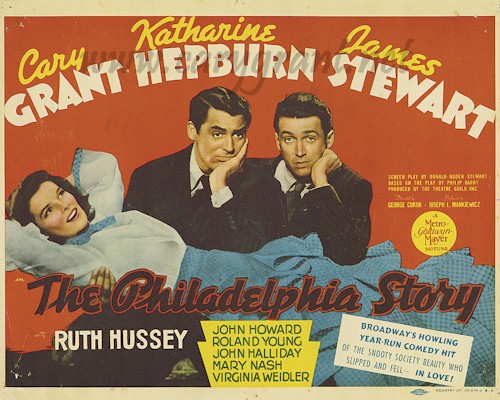Recently, I've been thinking about making a list of my 100 favourite movies, and which movies I would want to include, and through the magic of YouTube, have added a few to the running.

The Bachelor and the Bobby-Soxer would never make it as a modern film; the storyline is much too racey. This is especially interesting, because the actual content of the film wouldn't even warrant a PG rating today.
Cary Grant plays an attractive painter, who gives a speech at a high school about his views on America. A young girl in the audience (18-year old Shirley Temple) sees him and immediately falls in love.
Here comes the bit that would never make it past today's censors: through a series of unlikely but hillarious events, Grant's character is sentenced to become the beau of Temple's. The rest of the movie is spent exploring the aftermath of their forced courtship.
While a similar romantic situation might appear in a contemporary film, something tells me that 43-year-old Grant's on screen romance with 18-year-old Temple would more likely be the subject of a dark, dramatic movie, rather than one of a family-friendly film.
Personally, I think the movie is absolutely brilliant and - apart from the really creepy uncle - am in love with the characters.
 Bringing Up Baby is actually what got me started on this old movie kick to begin with. I watched Arsenic and Old Lace about a million times when I was a kid, so I've always been in love with Cary Grant. I went searching for other things he's been in, and through a series of random clips and fanvids, found my way to Bringing up Baby.
Bringing Up Baby is actually what got me started on this old movie kick to begin with. I watched Arsenic and Old Lace about a million times when I was a kid, so I've always been in love with Cary Grant. I went searching for other things he's been in, and through a series of random clips and fanvids, found my way to Bringing up Baby.The premis of this movie is so ridiculous that it doesn't bear explaining, but everything that happens in it, from beginning to end, is so screamingly funny that I happily watched it a second time within 24 hours of the first.
I have to say that I will never understand how or why people became so obsessed with Audrey Hepburn while Katharine was around. Katharine was much prettier and infinitely more talented than Audrey could ever hope to be - and her chemistry with Cary Grant in this film (and the two others of their's I've seen) is absolutely perfect.
By now, it might have become obvious that all the movies I'm listing star Cary Grant. If you're wondering, this is because I'm obsessed with Cary Grant and have been watching a lot of his movies lately. He is easily the best actor of his time (in my opinion), and one of the best in the history of cinema. I plan on marrying his straigh reincarnation, just as soon as I've found him.

Holiday is a great movie, and from what I've seen, fairly progressive for its time.
Grant's character, a self-made man, has fallen in love with the daughter of a wealthy banker, and together with her siblings, they are trying to convince her father to allow them to marry.
Unlike a lot of movies that were coming out back then (and actually, unlike a lot of movies in general), Holiday seriously bucks the status quo, suggesting that people should question the things they have always taken for granted - in this case, the reasons people work, and what should be sacrificed in order to maintain a marriage.
One of my favourite characters is the banker's son. He has a severe drinking problem, but rather than making his constant drunkenness the subject of humour or scorn, the film almost refuses to address it. He's a drunk, irresponsible, a pushover - and a good person who loves his family. Everything I love about this film can be summed up by watching the brother. I can't put it in better words; you'll have to watch the movie.
 The Philadelphia Story is another semi-serious romantic comedy, which I tend to enjoy.
The Philadelphia Story is another semi-serious romantic comedy, which I tend to enjoy.This is yet another movie in that turns the typical romantic comedy on its head. It deals with alcoholism, infidelity, and a bunch of other things. And unlike most modern-day romantic comedies, there isn't a good character vs. bad character thing going on here. Both Grant and Stewart's characters are good, honest men, and Hepburn's attraction to both of them is completely understandable.
This is the first film I've ever seen James Stewart in. He is brilliant in this movie. I actually found myself rooting for his character, which, considering how Grant-obsessed I am, is quite an achievement.
I suppose that's it for my Grant-centric romantic comedy edition of why black and white movies rock. It's kind of sad, though, knowing that I'll run out of new old movies one day. In the meantime, though, I'll enjoy them - probably a lot more than the modern ones.

No comments:
Post a Comment